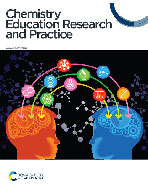Analysis of factors that affect the nature and quality of student laboratory argumentation
Abstract
Previous research on student argumentation in the chemistry laboratory has emphasized the evaluation of argument quality or the characterization of argument structure (i.e., claims, evidence, rationale). In spite of this progress, little is known about the impact of the wide array of factors that impact students’ argumentation in the undergraduate laboratory. Building on our previous work involving activity framing, we analyzed student arguments produced following eight experiments that comprise the first semester of a college organic chemistry laboratory. Arguments were characterized by a set of domain-general coding categories that were related to the nature and quality of student arguments. Further, we explored the impact of four laboratory factors on the quality of arguments produced across the eight experiments in the laboratory curriculum. Our analysis revealed no trends on the effect of experiment order or general type on the quality of student arguments; however, the amount and types of data sources as well as the level of scaffolding provided both had an impact on student argument quality. Although the undergraduate laboratory offers a ripe opportunity for students to engage in argument from evidence, laboratory activity involves a complex web of components each with the potential to affect productive and quality sensemaking. Our findings highlight the importance of explicit consideration of various laboratory factors and their impact on how students express their chemical reasoning through written argumentation.


 Please wait while we load your content...
Please wait while we load your content...